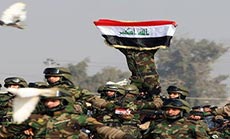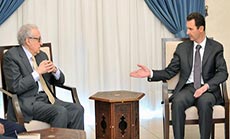"Israeli" Strike on Syria: Seizing an Opportunity

By: Hassan Illeik, Mohamad Bdeir
Al-Akhbar, February 1, 2013
For five years, "Israel" kept harping on about a "red line" that must be never crossed on its northern front. That "red line" was the transport of "balance tipping" weapons from the Syrian army to Hizbullah.
"Israel" was always insinuating that it was ready to conduct a pre-emptive military campaign at any time to thwart such transfer. On Wednesday, 30 January 2013, "Israel" decided that this line was crossed.
 Regardless of the identity and nature of the target hit by "Israeli" fighter jets, it is evident that Tel Aviv carried out an aerial aggression deep into Syrian territories against a target linked to the capabilities of the Resistance.
Regardless of the identity and nature of the target hit by "Israeli" fighter jets, it is evident that Tel Aviv carried out an aerial aggression deep into Syrian territories against a target linked to the capabilities of the Resistance.
This was confirmed by leaks from Haaretz about a modern air defense system, which could, create "a change in the regional balance of power," in the event it reached Hizbullah. The Syrian leadership also substantiated this interpretation, announcing that the targeted facility was connected to "raising the capacity for resistance and defense."
It's also in line with a statement from Yair Golan, head of the "Israeli" Northern Command, published in "Israel" Hayom on 6 April 2012: "What Hizbullah possesses today is haunting us. According to what we know, except chemical weapons, everything, no matter how advanced, was transferred to Hizbullah."
If that was the case, then what lies behind "Israel's" aggression on Syria last Wednesday? It is highly likely that what "Israel" destroyed was just one of the many prototypes of the defense system obtained by Syria. Yet one single piece of military equipment is not justification enough for this type of adventurous operation.
"Israeli" calculations are betting that this attack will help them score several points.
There seems to be only one variable that could explain the timing of the Israeli strike: the war raging inside Syria. Based on Golan's statement, we can assume that Israel had been previously aware of strategic weapons transfers to Hizbullah. This leads to another assumption: "Israel" did not have the courage to intercept such operations when they occurred previously. The reason is simple, the fear of a Syrian reaction at a time when Damascus still enjoyed stability and, thus, was capable of performing its strategic role in the Resistance axis, efficiently and forcefully.
On the surface, the attack is an exploitation of Syria's inability to reproduce earlier threats to impose the concept of the "red line," despite the fact that it had been crossed. So "Israel" employed the Hizbullah angle to justify getting involved in the current confrontation against al-Assad regime. Only under this pretext would it be able to legitimize its aggression on an international level.
"Israel's" direct involvement in the Syrian arena can only be understood in the following light. First, all former "Israeli" and non-"Israeli" bets on the imminent fall of al-Assad regime were shattered. Second, the situation in the field in the last few weeks tipped in favor of the regime. Third, the international community retreated from the idea of military intervention.
"Israeli" calculations are betting that this attack will help them score several points. The first is to stop planned transports of weapons that were free-flowing in the past. The second is to attempt to establish new "red lines" with regard to what the Syrian regime is allowed to have in terms of strategic weapon supplies. The third is to show that the fears of the outcome of external intervention is exaggerated as evidenced by the lack of a Syrian military reaction to the "Israeli" bombing. The fourth is providing the armed opposition on the ground with a push by distracting the Syrian army with a new front. This is in addition to its moral embarrassment by showing the regime as "determined against its people and reticent towards "Israel"."
Comments

France’s Hollande in Qatar for Warplane Deal
10 years ago
Iraq Police Dismantles Al-Qaeda Protest Site
11 years ago

